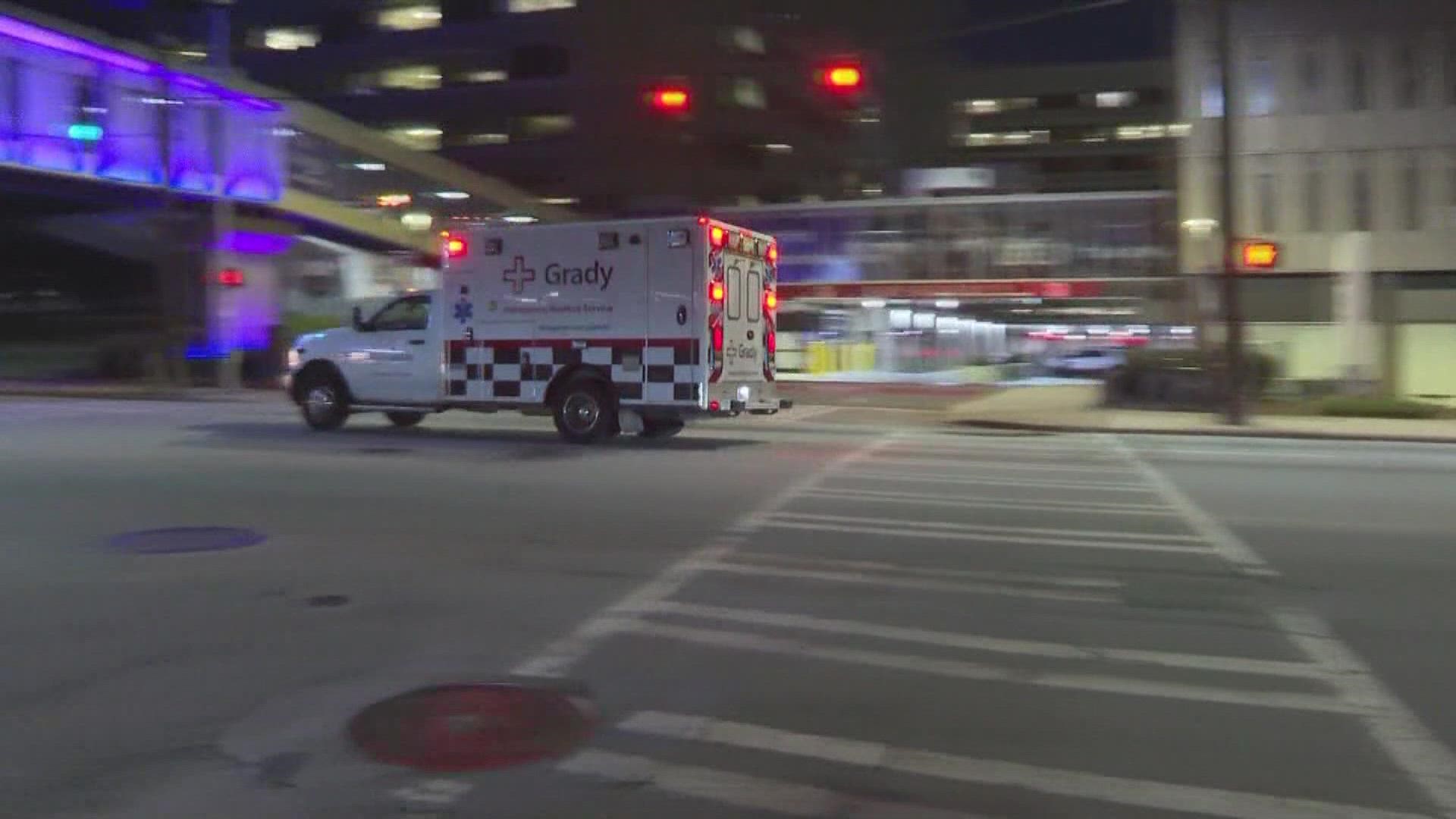ATLANTA — Gun violence continues to hurt communities across the country, and it's a reality doctors at Grady Hospital face every day.
Recently, 11Alive got a chance to visit the Marcus Trauma Center to see first hand what the hospital is doing to stop the cycle.
"We see violence, all times of the day, all times of the night, weekdays and weeknights as well," Dr. Randi Smith from Grady's Marcus Trauma Center explained. "I truly believe violence is a public health problem. What that means is that we treat it just like any infectious disease. When there is an outbreak we contain it, we understand the root causes and prevent its spread."
The hospital is in a unique position to take on such a role, Dr. Smith said, which is why Grady will launch a hospital-based violence intervention program in January, a move she believes "really is the start of violence reduction on a large scale."
The hope is such a program will save lives, with intervention starting in the emergency room or a patient's bedside. According to hospital data, the number of trauma patients admitted due to violent crimes increased 50 percent at Grady since May 2020. The disparities are also significant, Smith said. Eighty-four percent of the victims of violent injuries are male, and 88 percent are people of color.
Research further shows victims are not only at an increased risk for reinjury (40 percent), they can also be prone to retaliation. As a result, Grady's new program aims to stop that cycle of violence, using "credible messengers" who've lived through it to reach teens and young adults, bringing support and resources to a patient's bedside.
One of those is Jeffery Gates, who was taken to Grady after being shot by a stray bullet seven years ago.
"I just remember I saw somebody having an argument, and I wasn't paying attention," Gates said. "I was getting ready to leave the store, and I heard a couple of gun shots, and I started running."
Gates ran around the building, he said, and laid down before realizing he'd been hit by a stray bullet. The last thing he remembered was first responders telling the ambulance to take him to Grady Memorial Hospital.
"When I woke up, it was a couple of days later," Gates said.
That time, he remembered, was fraught with emotional upheaval. But it was also life-changing.
Gates added that he now appreciates being able to talk to others and help them get through situations similar to the one he went through all those years ago.
Yet, the hospital is just the start. Groups like the Hope Hustlers will also help both in the hospital and beyond.
"We're known in the community for helping people," Leonard Dungee with Hope Hustlers said. "We come through a referral whether it's the hospital or community. They know us, and they welcome the help."
Such help will not only extend to the victim but family members, Dungee explained, with outreach including resources, support and follow up. That trust can translate into a plan for recovery and helping patients' meet basic needs with the goal to better understand the cause of gun violence and stop it.
"We want to stop it before it happens. This is done with the relationships Hope Hustlers has with the community," Dungee added. "Now that we're partnering with the hospital, it allows us a point of attack, so to speak, so we can start to heal right there at that situation, and in the meantime extend what we're doing in the community."
The Hope Hustlers themselves have been working in the Atlanta area for over 20 years, according to Volkan Topali, a researcher and professor of criminal justice and criminology at Georgia State University.
“They're certified, trained by Cure Violence Global. They have a vast network of violence interrupters, but also outreach workers and a Rolodex that's pretty impressive when it comes to looking at wraparound services and additional services that could come later on. So they're really the perfect partner for this kind of a program,” he explained.
Topali, who himself has been a victim of gun violence, said there is hope Grady's program would not only relieve Atlanta’s only remaining Level One trauma center, but also serve as a relief to law enforcement as well.
In fact, the hospital component, which will launch in January, is part of a larger three-year crime intervention effort in Dekalb County, funded by a $1.5 million grant from the U.S. Department of Justice. The grant encompasses a larger effort to track and analyze violent crime data and provide wraparound services, according to Debra Furtado, human services administrator for Dekalb County.
“I think in society we tend to think that solving this problem is a responsibility of the police department. It is not,” Furtado said. “It's really a community issue.”
While the grant funding is unique to Dekalb, it continues efforts already underway, such as the county’s investment in a trauma recovery center and violence prevention program at Emory Hillendale. Furtado and others hope such initiatives will set an example for which surrounding counties in the metro can also benefit.
“Once we have this [data]…other counties can work with us and borrow from us,” she added. “The idea is we all need to be in this together.”
For Dr. Smith, there’s hope in the collaboration that’s coming.
“To see just one, two, ten, 100 people that don't come back to the hospital,” she said. “That give us follow up and say, ‘Hey, meeting that credible messenger at the bedside. It changed my life.’”

